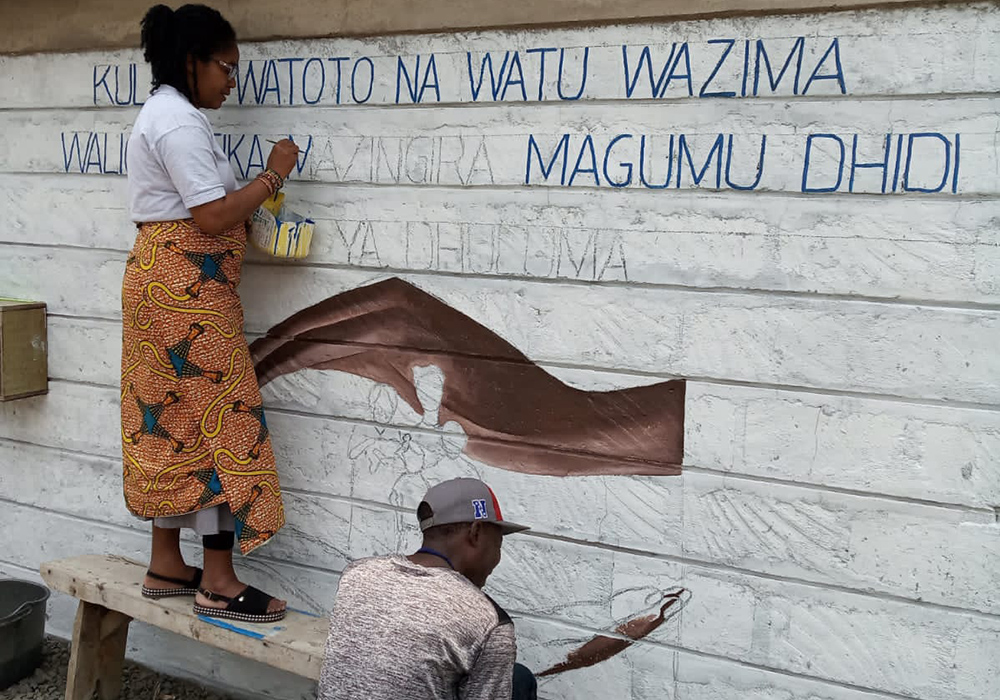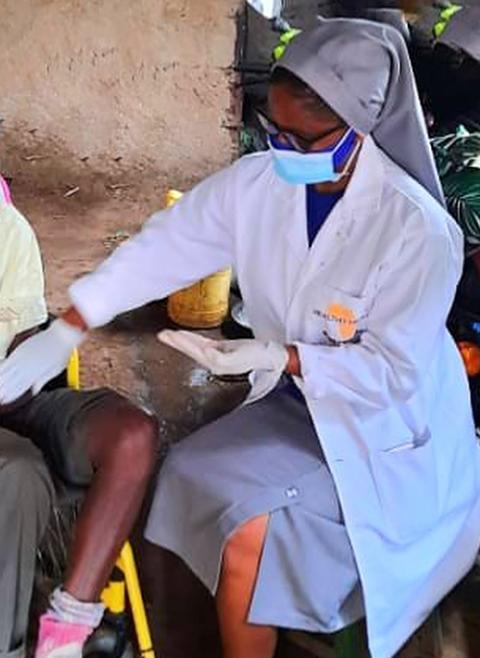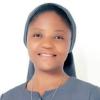
The ministry of the Medical Missionaries of Mary includes medical services and empowerment against gender inequality. Sister Sr. Liana de Jesus, with one of her students, has designed a child-friendly corner within one of the health facilities of Medical Missionaries of Mary. She engages youth and teenage single mothers in skills training. As part of their healing charism, Sr. Prisca Ovat coordinates the medical outreach program for people living in slums. (Courtesy of Prisca Ovat)
Responding to God with creative fidelity, I left my home in Nigeria in 2013 to go to Kenya, trusting in the God of the missions to help me blossom wherever I was planted. Like the spring flower, I did bloom in my new home.
I am a sister of the Medical Missionaries of Mary, an international missionary congregation of religious women founded in 1937. As our website states, as a congregation, we work collaboratively with the communities we serve by creating unique medical, human and social services to help people in challenging circumstances. To meet these needs, we "are trained professionally in [holistic] medical, social and related services with a particular concern for women and children."
Apart from medical services, some of our other projects address food insecurity by helping people create small gardens and do seed-sharing projects. We also combat gender inequality through empowerment programs like computer training, hairdressing, tailoring and crafts. Overcoming gender-based violence and human trafficking have been two of our major advocacy programs.
In recent years, we have focused much of our ministry with the people of Kibera, Kenya. Kibera, the largest urban slum in Kenya and one of the largest in Africa, is a neighborhood on the outskirts of Nairobi. Gender inequality is especially evident in education. Teenage girls are forced into early marriages, so their "bride price," given by the groom's family, goes to educate the male children.
The practice also exposes girls to the risk of human trafficking. Many girls that come to us have been tricked with the promise of a better life from young men. This promise lasts until the young girl becomes pregnant, and the man disappears, never to be seen again. The situation becomes complex with the evident reality of teenage single motherhood and the surge of street children.
In the spirit of our charism, Sr. Liana de Jesus, a Medical Missionaries of Mary sister from Brazil, engages youth and teenage single mothers in skills acquisition — such as sewing, fabric designs and painting, bottle bricks, and wall painting. She shares her creativity with these enthusiastic young people who want to change the direction of their lives. The skills training is free, and the participants are empowered to set up small-scale businesses upon completing their training.
In Eldoret, another Kenyan city, Medical Missionaries of Mary sisters are deeply engaged in health and medical services, targeting people experiencing poverty in the slums. As part of our healing charism, I work in this mission, coordinating the medical outreach program. I accepted this responsibility with great enthusiasm, as I was unaware of the task ahead. It turned out to be more difficult than I had imagined, the most profound aspect being the palliative care unit.
Every day of the week, I was working in the field of home-based care, listening to all the heartbreaking stories and keenly noting the devastating impact of poverty on the people. I soon established that every patient in the program suffered from one or more disabilities and needed total or supported care.

Sr. Prisca Ovat and volunteers attend daily to communities' palliative and sanitation needs. Ovat and some volunteers enrolled in a massage course to optimize their patient care. She says that this has had a tremendous impact on their patients' well-being. (Courtesy of Sr. Prisca Ovat)
Learning on the job brings a new dimension of growth, but how does anyone learn on this job? Without prior knowledge or a background in palliative care, my resolve to remain present to the people disappeared almost as soon as I started. I often returned home emotionally and physically drained. Somewhere along the line, I sought counseling to process my feelings and find my path. Deep peace and determination were the fruits of this process, so I built up my resilience to get on, at least for the children enrolled for these services.
Health and social needs constantly emerge and diversify in a manner that only collaborative efforts can attempt to solve. For this purpose, I trained and supervised 35 volunteers chosen from small Christian communities within the 11 villages benefiting from the services of the Medical Missionaries of Mary project. With these volunteers, we daily attend to the communities' palliative and sanitation needs. Moreover, I enrolled in a massage course with some selected volunteers, to enhance their services and optimize patient care. This formation has had a tremendous impact on our patients' well-being.
Stephen is a beneficiary of our massage services, and many more have experienced tremendous improvements in their health. As a successful taxi driver, Stephen went about his daily affairs with hypertension, feeling well all along until he had a stroke. His ordeals led to the dislocation of his already paralyzed hand and necessitated use of a wheelchair — an unexpected traumatic experience of immobility and dependence.
Meeting him for the first time, we were shown all his MRIs and X-rays, as he persistently asked that we help him walk again. Although the situation appeared impossible, the volunteers and I courageously plunged into the massage therapy, believing his miracle was an inch closer. The Medical Missionaries of Mary medical facility also arranged physiotherapy sessions for him twice weekly at the referral hospital. And that was it! He got the speedy recovery he craved. After one month of person-centered care, he dared to take several steps unsupported.
Advertisement
The healing charism is a broad concept that reshapes our understanding of disease and well-being. Beyond the physical and medical interventions, counseling appears time-consuming in an attempt to convince a patient that their well-being is their responsibility and our priority. Yet, such counseling or orientation is crucial. Determined to harness all our power to convince, we get the obstinate person off the street sometimes with a cup of porridge, especially when their health status has become a public health concern. That was the case of Moses, who recently completed his tuberculosis medications successfully, thanks to the availability of porridge and the power of words.
In the final analysis and evaluation, it appears that poor or inadequate health education can be a major root cause of noncommunicable diseases, thus contributing to fatalities within the communities. Responding to this threat, and because some chronic diseases have proven difficult to manage in underdeveloped areas and in settings of poverty, I have prioritized health education for volunteers who, in turn, teach the people about the prevalence of noncommunicable diseases in their locality; how to recognize the signs of each disease; and how to ask for help in a timely manner. We hope many of those we encounter can be helped to take responsibility for their own health.
Indeed, every success story is a challenge, but God has always shown the way as often as he wanted the work.







